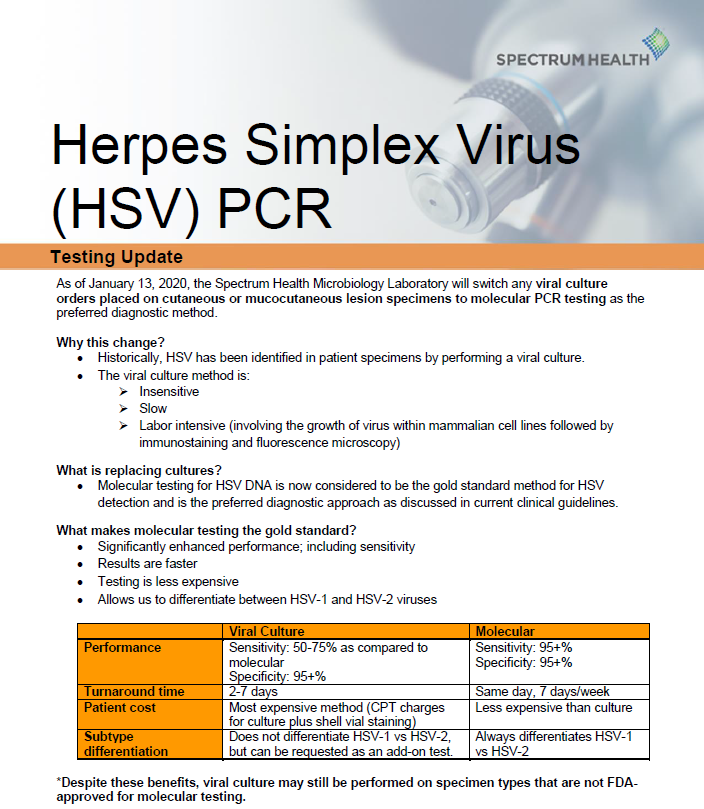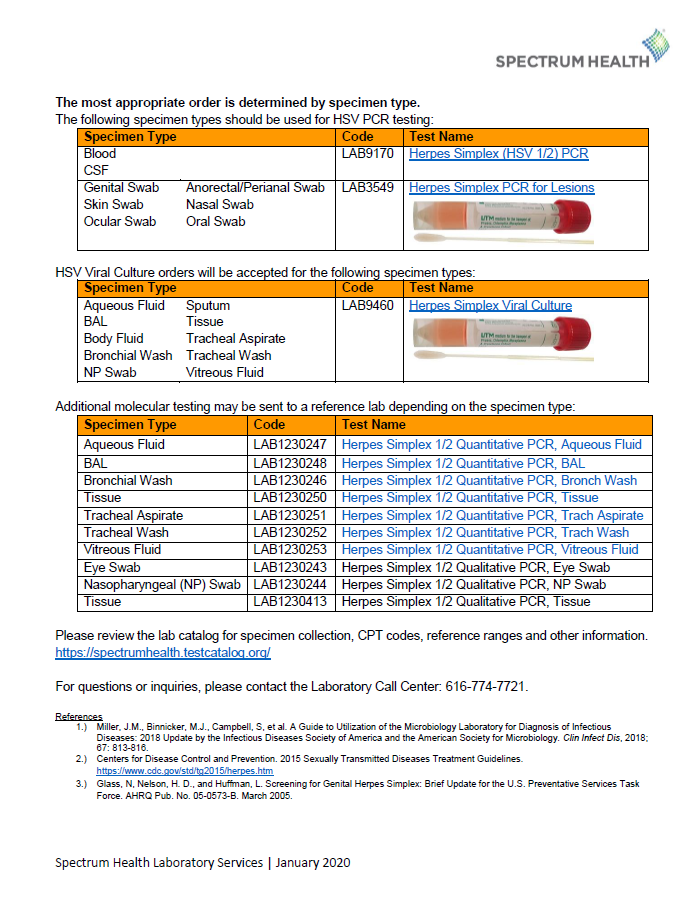Test manufacturer supply chains continue to be disrupted due to COVID-19. Currently, there is a shortage of supplies for the Group B Streptococcus PCR test. Orders for this PCR test may continue to be placed, however, the SHRL Microbiology Department will perform a culture method until PCR supplies are available with appropriate charging and a reporting comment indicating that the culture was performed. The PCR test is normally resulted within 24-48 hours of specimen receipt in lab, whereas the culture method turnaround time may be 48-72 hours. An update will be posted when these PCR supplies are received, however, there may continue to be intermittent supply issues for this test. Additional test information can be found here.
Infectious Disease
REMINDER: Herpes Simplex Virus (HSV) PCR and HSV Culture Orders
As of January 13, 2020, the Spectrum Health Microbiology Laboratory will switch any viral culture orders placed on cutaneous or mucocutaneous lesion specimens to molecular PCR testing as the preferred diagnostic method.
Please refer to these documents for specimen collection information and appropriate ordering codes:
Effective May 18, 2020, Spectrum Health Regional Laboratory is pleased to be offering in-house COVID-19 serology testing, with initial availability 1,000 tests per day.
What is Serology Testing?
• Serology testing measures the body’s immune response to COVID-19 infection in the form of antibody production against the SARS-CoV-2 virus.
• There is a single COVID-19 serology order available in Epic, however, the Spectrum Health laboratory performs two versions of antibody testing to increase specificity and avoid reporting false positive results. An initial screen will be used to measure total antibody (IgA, IgM, and IgG), and positives will be confirmed by a second method that is specific to IgG.
• Specificity is critical when the expected prevalence in a community is low. This serology testing is not expected to cross-react with other circulating coronaviruses that cause the common cold.
• A positive IgG result indicates previous infection with COVID-19, but does not indicate immunity or protection against future infection.
• This test should not be used to detect acute COVID-19 disease. Symptomatic patients suspected to have acute COVID-19 infection should be tested using a molecular assay.
• Whether positive or negative for the presence of COVID-19 antibodies, serology testing results do not support easing of behaviors such as social distancing, wearing masks, or hand hygiene.
Effective Wednesday, November 13, 2019, the new Mycoplasma genitalium (mgen) assay is now available using the Aptima target nucleic acid amplification test (NAAT) for the qualitative detection of ribosomal RNA (rRNA) from Mycoplasma genitalium to aid in the diagnosis of M. genitalium urogenital infections in male and female patients.
Effective Monday, March 25, 2019, Syphilis Antibody Screen IgG [LAB3076] will change to Syphilis Total Antibody Screen [LAB1230501]. This test is also included in the Prenatal Screen (OB Panel) [LAB1230094].
In anticipation of “Flu season”, it is valuable to revisit available testing methods for influenza and discuss when each test should be ordered. Though generally a self-limited infection for otherwise healthy individuals, influenza can be particularly severe for high-risk populations including infants, elderly, pregnant women, and immunocompromised hosts. Influenza incidence is largely seasonal with the majority of cases occurring between December and April of each year.



